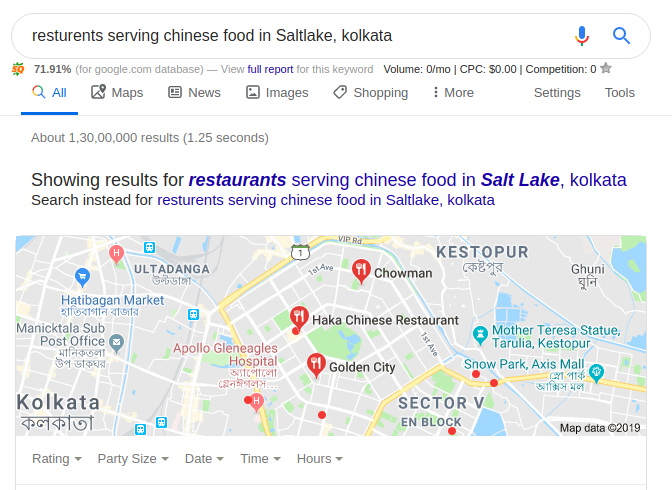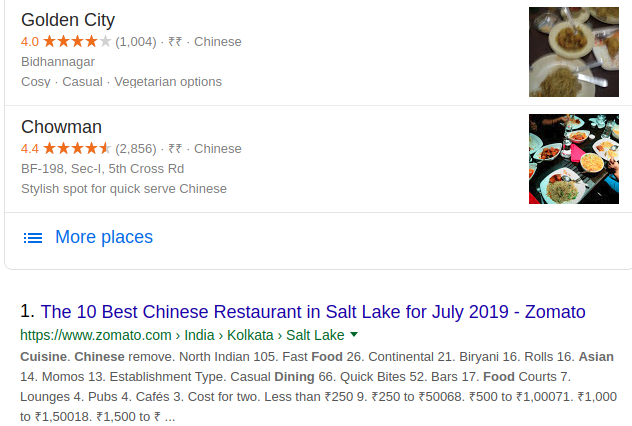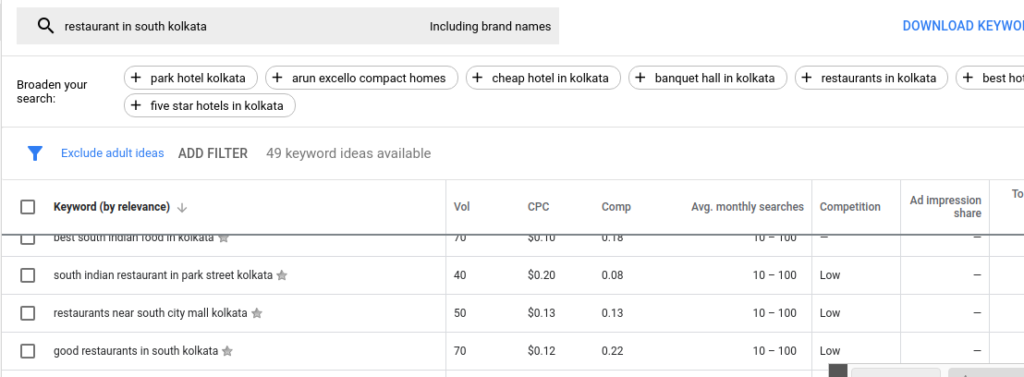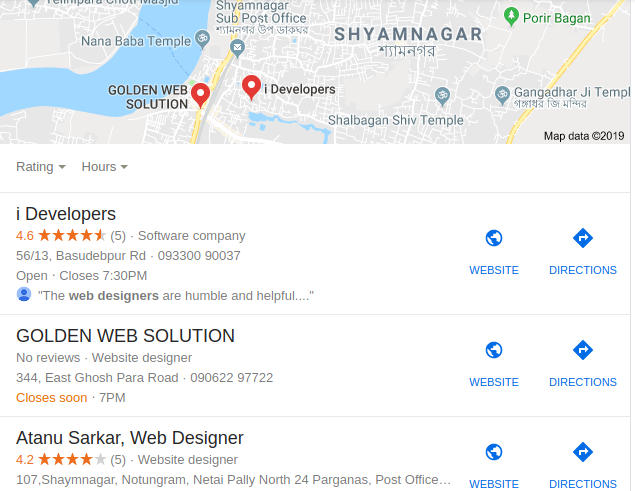Local search engine optimisation: 10 ways to dominate in the local search
Local search engine optimization is a part of SEO to make a website visible in local search. Its focus is on getting customers near the physical location of the business.
Your website is optimised in such a way that it ranks on local keywords like “restaurant near me”, or “plumbers in Kolkata”.
Local SEO is not suitable for all types of businesses, there are some businesses can benefit more from this SEO.
Some of the businesses that can leverage local SEO are:
1. Doctors
2. Lawyers
3. Hotel businesses
4. Restaurant business
5. Local Stores that mostly deal with local customers
So, if your target is local customers then applying the techniques we have mentioned will be beneficial to your website.
It is also widely known as Google local optimization as Google is the number one search engine but here we will discuss to optimise your website in all types of Search Engines.
This process requires both On-Page and Off-Page efforts. In normal SEO also, same on-page and off-page activities are done but the differences are the focus and works involved.
In this article, we will discuss the works involved in optimizing your website for local search in steps.
1. Competitor Analysis:
The is the first step and it applies to all types of SEO whether you are targeting local, national or international. Competitor analysis is an important step that shouldn’t be avoided at any cost.
There are various ways you can analyze your competitor’s websites. To do that you first need to identify your competitors.
The simplest way is to open the Google search engine and find them with local keywords.
Now you may be thinking that businesses that sell the same products or services that you are selling in your locality are your competitors.
Like if you have a restaurant business in South Kolkata, then restaurants near your business are your competitors. But this is no right way to find your competitors.
You need to narrow down your search like if you have a restaurant selling Chinese dishes, search for those restaurants that are selling Chinese in your locality.

Now those restaurants that are showing on the first page are your competitors. But wait, not all of them are your competitors.
Sometimes those businesses are also shown in the local search are not located in that place.
Often business listing sites like Yelp pop up in the search results and those are also not your competitors.

Now note down the names, URLs, keywords, backlinks, and important metrics of your competitor websites. You have to do better than your competitors to rank higher than your competitors. We have discussed competitor analysis in details in another article. Please check that.
You can also use paid tools for competitor analysis but you can also do without those expensive tools.
Now, you have an idea about your competitors, you can make a complete local SEO strategy for your website.
You can now go to the next step where you are about to learn the most important part “Keyword research”.
2. keyword research:
In the local search engine optimization, Keyword research is the most important part that if used smartly can boost your site ranking in the local search results.
There are certain points that you need to consider when choosing the right keywords for your business.
Use location in your keywords: If you want to optimise your website for local search, it is crucial to add a location with your keywords. For example, if you have a bicycle store in Lake Town, Kolkata, then your keyword should be “Best bicycle store in Lake Town Kolkata” or “Bicycle store in Lake Town”.
But you should not use those keywords that have no search volume because it is very easy to rank in those keywords that have no or low competition without any search volume.
We recommend you to use Google Keyword Planner because it is free. List down those keywords that have good volume. You can also take those phrases that have medium competition because in general, it is easy to beat your competitors in local SEO.
Also, check who are those competitors that are ranking on your selected keywords.

3. Title tag & meta description:
Title tag and meta description are the places where you can use your main keywords. Your keywords must look natural to the human. Write an informative title and description for your customers.
Writing compelling copy will increase your CTR and using keywords can boost your website ranking locally.
Avoid keyword stuffing as Search engines are smart and can detect that. We have discussed writing the title and description for your website in details in another article.

71% of people search for a business online locally to confirm the existence of a business.
4. Optimizing for voice search:

Google CEO Sundar Pichai announced that 1/5th of the queries on Google search engine are voice searches. That means your local customers most probable are searching for your products or services through Alexa or similar devices. This trend is increasing.
So, it is the concern of every online marketer to optimise his site for voice searches.
There is no such specific thing that you can do to optimise your website for voice search but there are a bunch of things you can do.
Use LSI keywords naturally in “Alt” of the images in your site. Optimise your site for faster load.
Use microdata in your site, we would recommend Jason ld.
You need to understand that in voice search, the phrases are usually longer than text search. So, now you want to leverage this by using long-tail and informative keywords. But no this is not the right way.
Usually, people search question like phrases different from the text-based long-tail keywords.
You can get those phrases with a tool like “answer the public.”[https://answerthepublic.com]
We will publish an article based on Voice Search in the future where you will get detailed information.
5. Local directory Submission & Citation:
It is the part of Off-Page SEO and you can leverage this technique to get high-quality backlinks and direct local traffic to your website. This is a huge opportunity that many businesses miss out.
You can search for your local directories: [“Your location/City”] directory. Get your site listed in those directories. There are local directories which have high Domain Authority. We have discussed in details about domain authority and backlinks.
Claim those listings later. Put NAP – Name, Address, and Phone number correctly for citation. High-quality backlinks help increase domain authority and ranking of a website.
6. Google My Business Page Optimization:

It is a directory from Google and is a very important step for Google local optimization. You need to claim your business here for getting listed.
Google sends a postcard in which you get a PIN to your physical location. To claim your business, you need to log in your account and verify your account by entering that PIN.
But, just listing your business doesn’t mean you can get local traffic for your website. You have to fill up the details correctly. If optimised properly, your website will be shown in the local-three pack that can bring huge traffic to your site without paying a single penny.
Write a compelling description of your business, give business hours, payment information, photos (at least three), and fill all the fields possible. This way you can optimise your listing for local search.
7. Online Reputation Management:
Reputation management is a challenging job but if maintained properly, it can give a positive result. Survey says that more than 80% of the customers believe online reviews. It has a great psychological effect.
There are various tools like Hootsuite, Tiny torch can help you to get alerts whenever your business name is mentioned. You should also track Google reviews and answer the queries from your customers. There are lots of places online where people discuss different brands. You should join those discussions and give positive reviews of your brand.
8. Schema Markup:
Using schemas for structured data can greatly enhance your local search. It informs search engines about your business, products, and services in details.
We recommend you to visit this website here for microdata.
Add Jason ld script in your web pages but before that, check for any error here.
9. Leverage Social Media Channels:

Social media channels mostly give no-follow links [know about no-follow and do-follow in our another published article] but they help you to target local customers.
It doesn’t help optimising your website directly but it has a great impact. It gives a Social signal to Search engines. You can bring traffic to your site through channels like Fb, Twitter mainly because it is easy to target customers there.
10. Video promotion:

Like Social media, it does not have any direct effect on optimising your site for local search but it helps in getting traffic and increase brand awareness.
Video is the present and future of digital marketing so you should also leverage it now for your business. Getting huge traffic through video promotion can greatly enhance your website ranking. You can post regular videos on Youtube, Facebook and promote your business.
So, these are 10 ways you can optimise your website for local search. We hope you apply these steps and rank your website locally. You can also contact us for local SEO optimisation of your website. We have many years of experience in web development and digital marketing.
Also, go through on the topic “Small business SEO Tips” published in another article.


